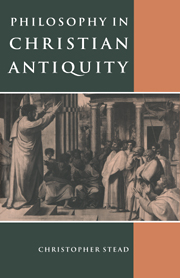Book contents
- Frontmatter
- Contents
- Preface
- List of abbreviations
- PART I THE PHILOSOPHICAL BACKGROUND
- PART II THE USE OF PHILOSOPHY IN CHRISTIAN THEOLOGY
- 8 The debate about Christian philosophy
- 9 Greek and Hebrew conceptions of God
- 10 Proofs of the existence of God
- 11 God as simple unchanging Being
- 12 How God is described
- 13 Logos and Spirit
- 14 Unity of substance
- 15 Substance and Persons
- 16 Christ as God and Man
- 17 Two natures united
- PART III AUGUSTINE
- Bibliography
- Index of Names
- Index of Subjects
8 - The debate about Christian philosophy
Published online by Cambridge University Press: 29 September 2009
- Frontmatter
- Contents
- Preface
- List of abbreviations
- PART I THE PHILOSOPHICAL BACKGROUND
- PART II THE USE OF PHILOSOPHY IN CHRISTIAN THEOLOGY
- 8 The debate about Christian philosophy
- 9 Greek and Hebrew conceptions of God
- 10 Proofs of the existence of God
- 11 God as simple unchanging Being
- 12 How God is described
- 13 Logos and Spirit
- 14 Unity of substance
- 15 Substance and Persons
- 16 Christ as God and Man
- 17 Two natures united
- PART III AUGUSTINE
- Bibliography
- Index of Names
- Index of Subjects
Summary
During some four centuries in late antiquity, from the second till early in the fifth, two systems of belief and moral direction existed side by side. At the start of this period well-educated men in civilized Europe looked to philosophy for guidance; as we have seen, the Platonic tradition was already strong and would soon be dominant. Philosophy was taken to comprise logic, ethics and physics, which included the beginnings of what we now call natural science. Ancient logic led up to the theory of knowledge; ethics enquired what sorts of good we should aim at securing, and how to achieve them in practice.
At the outset of this period Christianity did not look like a counterpart to philosophy; indeed it was not always recognized as a distinct movement independent of the Judaism from which it sprang. But it developed very rapidly, and by the end of our period it had captured the intellectual allegiance of cultivated citizens in both the Eastern and the Western Empire. Compared with other religions of its time and place it was far more successful in organizing its beliefs into a coherent system. In doing this it borrowed largely from philosophy, and especially from Platonism. But it kept a sharply defined identity; its commitment to the Bible as a sacred book was far more uncompromizing than the philosophers' respect for Plato; and it valued communal experience and tradition in a way which offended students accustomed to accepting the guidance of expert scholars. Nevertheless philosophy helped to mould its beliefs about God and the world, and taught it to uphold them in argument.
- Type
- Chapter
- Information
- Philosophy in Christian Antiquity , pp. 79 - 94Publisher: Cambridge University PressPrint publication year: 1994

